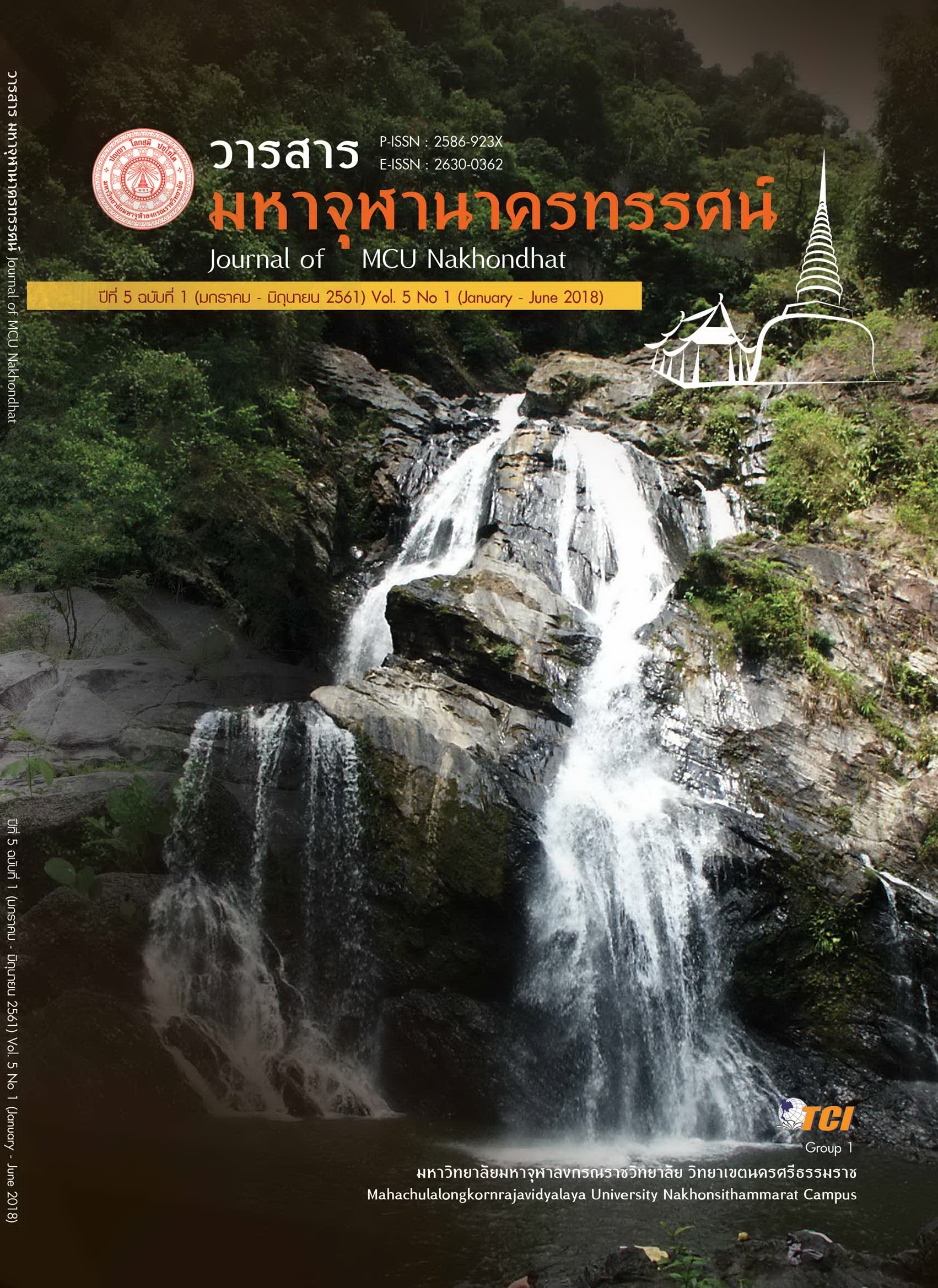The Sanggha Administration of the Sanggha in Southern Thailand
Main Article Content
Abstract
The objectives of this thesis were as follows 1) To study the Sanggha administration of the Sanggha in Southern Thailand, 2) To study the efficiency and administration process of the Sanggha in southern Thailand, 3) To study the factors enhance the learning process that affect the efficiency of the Sanggha administration in the southern Thailand. The population are 2,344 the temples and the samples are 331 the temples by Taro Yamane table. The key performance 15 the Sanggha The research are mixed methods research. The collecting data used in depth interview and the observation for observe the sanggha meeting The statistics used to analyze the data were frequency, means, percentages, standard deviations.
The research findings revealed that:
- The procedure on The Sangha administration in the southern Thailand was at the middle level in general . They are put in order from high to low as the following : In the field of director, in the field of supervisor , and in the field of budgeting .
- The efficiency and management of the Sangha administration in the southern Thailand was at the middle level in general . They are put in order
from high to low as the following : In the field of governance , in the field of public works , and in the field of public housing .
- The factors that enhance the learning process that affect the efficiency of the Sangha administration in the southern Thailand found that the variable factors with the best predictive power are 4 variables. They are put in order from high to low as the following : In the field of supervisor , in the field of director , in the field of budgeting , and In the field of organizational management .
The Sangha administration in the southern Thailand was at the middle level that means to improve in a management for being effective. This can be summarized as follows.
1) The Executive Order of the Sangha in the southern Thailand or related parties should participate in the planning of the entire management system, regular meetings follow up, and staffing in the right job. Use skills and management capabilities and adaptive command communications by using powerful modern technologies to ensure that the administration of the Sangha is effective in the current situation.
2) The Executive Order of the Sangha in the southern Thailand or related parties should factor in the efficiency of the administration of monks in the south such as broadcasting, radio and other media, the way in how to distribute propagation to monks and novices, leadership training in quality meditation, providing accommodation for the faithful guests and the monks and maintenance of local arts and Thai culture by providing the responsible person in various fields. It is a system for the prosperity of a stable and lasting Buddhism.
Article Details
References
นิธิ เอียวศรีวงศ์. (2536). มองอนาคต : บทวิเคราะห์เพื่อปรับเปลี่ยนทิศทางของสังคมไทย. กรุงเทพมหานคร : มูลนิธิภูมิปัญญา.
พระเทพปริยัติสุธี (วรวิทย์ คงฺคปญฺโญ ). (2554). การคณะสงฆ์และการศาสนา. กรุงเทพมหานคร: โรงพิมพ์มหาจุฬาลงกรณราชวิทยาลัย.
พระธรรมโกศาจารย์ (ประยูร ธมฺมจิตฺโต). (2549). พุทธวิธีการบริหาร. กรุงเทพมหานคร: โรงพิมพ์มหาจุฬาลงกรณราชวิทยาลัย.
พระธรรมญาณมุนี (ทองย้อย กิตฺติทินฺโน). (2526). วัดจะช่วยชาวบ้านได้อย่างไร. ใน การแสวงหาเส้นทางการพัฒนาชนบทของพระสงฆ์ไทย. กรุงเทพมหานคร: เอกสารอัดสำเนา.
วิจิตรา แป้นจันทร์. (2553). “ปัจจัยที่ส่งผลต่อความสำเร็จในการปฏิบัติงานตามหลักธรรมาภิบาลขององค์การบริหารส่วนตำบล ในจังหวัดกำแพงเพชร”. วารสารมนุษยศาสตร์และสังคมศาสตร์,ปีที่ 16 ฉบับที่ 1, 145 -146.
ส่งศรี ชมภูวงศ์. (2554). ระเบียบวิธีวิจัยทางสังคมศาสตร์. นครศรีธรรมราช: มหาวิทยาลัยมหามกุฏราชวิทยาลัย.
สำนักเลขาธิการมหาเถรสมาคมกรมการศาสนา. (2542). คู่มือพระสังฆาธิการและพระวินยาธิการ. กรุงเทพมหานคร: กระทรวงศึกษาธิการ.
เอการ์วาร์ (Agarwal). (2530). อ้างใน ดร.ปธาน สุวรรณมงคลและร.ศ.ดร.อุทัย เลาหวิเชียร. ใน การบริหารและการพัฒนาองค์การ (หน้า 7). นนทบุรี: สำนักพิมพ์มหาวิทยาลัยสุโขทัยธรรมาธิราช.


